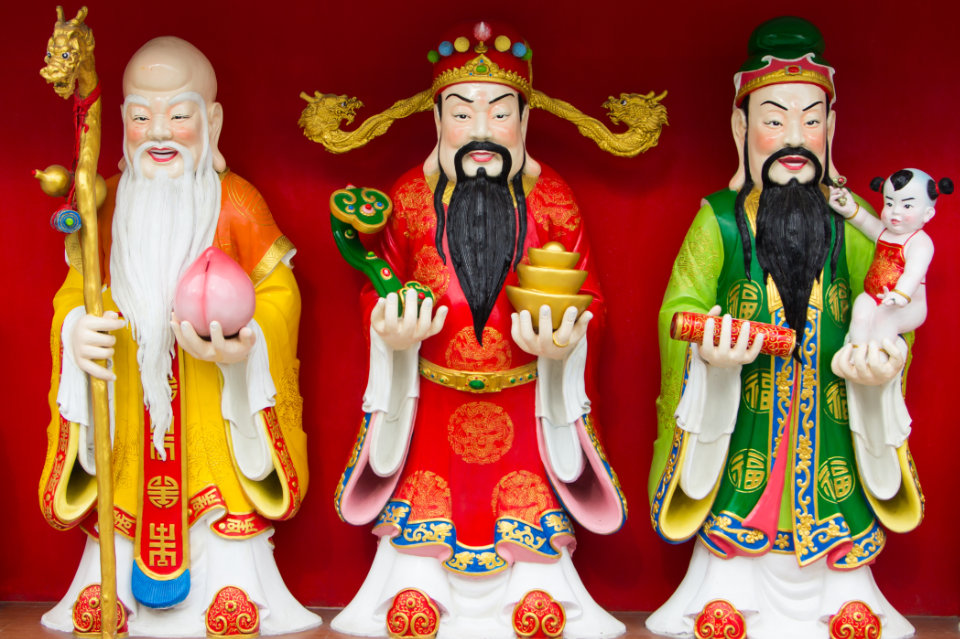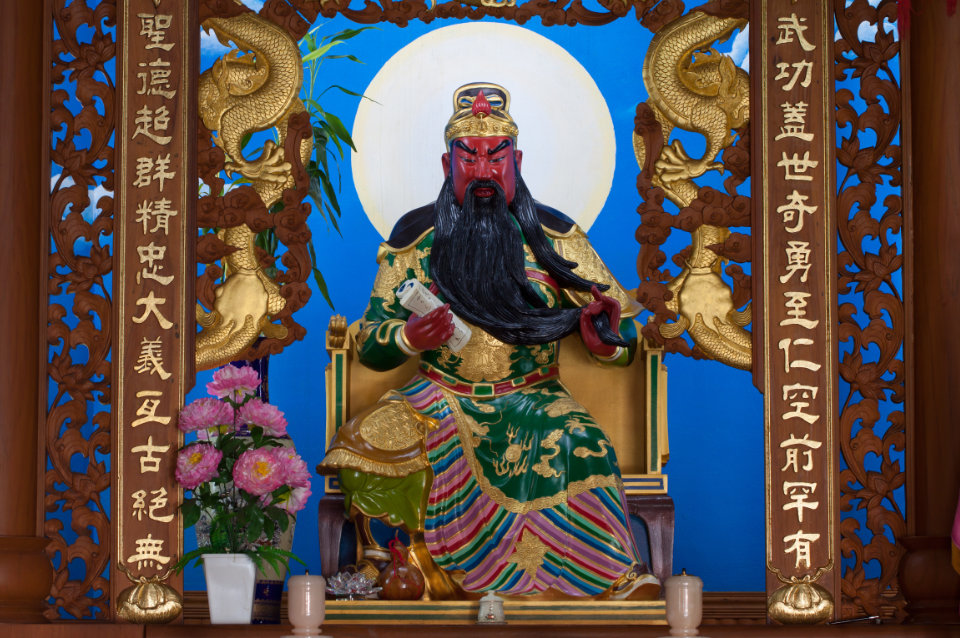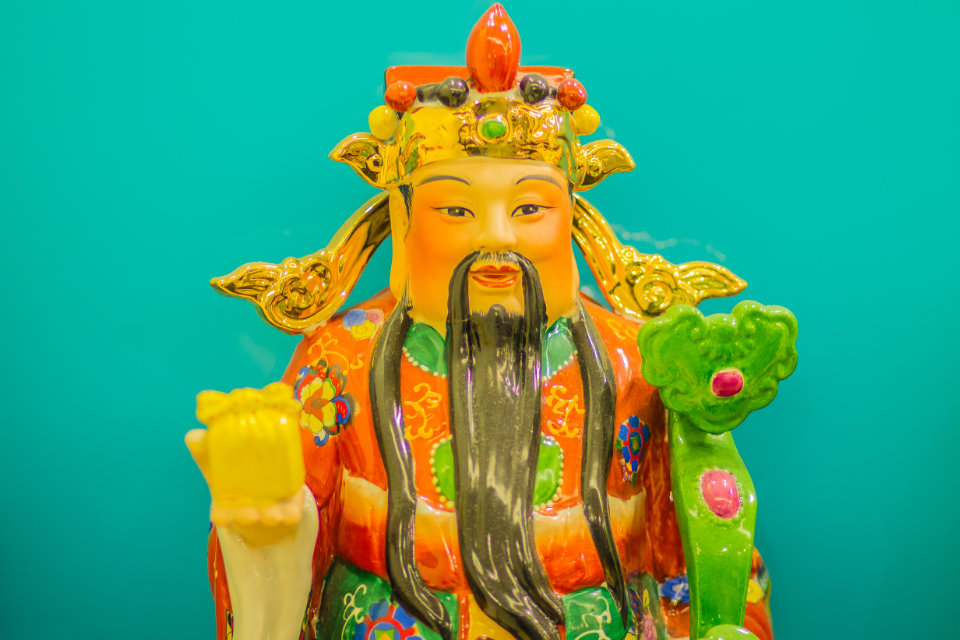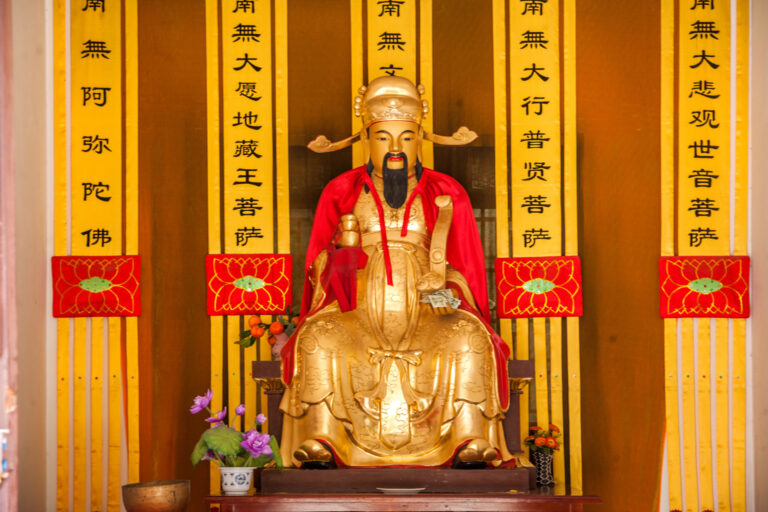Seeking a year brimming with abundance and prosperity? Incorporate the wisdom of Feng Shui by embracing the time-honored practice of welcoming the God of Wealth or Cai Shen into your home or office during the Lunar New Year.
According to traditional Chinese geomancy culture, households commemorate the God of Wealth’s birthday on the fifth day of the first lunar month, inviting prosperity for the forthcoming year.
Table of Contents
Who is the God of Wealth
Dating back to ancient times, the Chinese have worshipped various deities associated with wealth. The God of Wealth is depicted in several forms, such as the “Martial God of Wealth” (“武财神”), “Civil God of Wealth” (“文财神”), “Five-Road God of Wealth” (“五路财神”), “Quasi God of Wealth” (“准财神”), and the “Partial Wealth God” (“偏财神”). Each has its unique story and significance.
For instance, the “Five Prominent Gods of Wealth” (“五路财神”) were brothers who supposedly robbed the rich to help the poor and continued to promote good after their death.
Known as the “Civil God of Wealth” or the “Star of Wealth” (“财星” in Chinese), this deity is also referred to as the “God of Increased Fortune” (“增福神”). Typically, his image is displayed alongside three deities known as “Fuk” (“福” – Happiness), “Luk” (“禄” – Prosperity), and “Shou” (“寿” – Longevity). Together, they are referred to as Fuk, Luk, Shou, Happiness, and Wealth.

The Star of Wealth is often depicted with a white face, long hair, and holding a basin filled with treasures, signifying the phrase “attract wealth and treasure”.
The Civil God of Wealth is known as Bi Gan (比干), while the Martial God of Wealth includes Zhao Gongming (赵公明) and Guan Yu (关羽). Some businesses choose to worship Zhao Gongming, the Martial God of Wealth, throughout the year, seeking victory and harmony in commercial competition.
Others worship Guan Yu, portrayed with a red face, for his renowned virtue, aiming to achieve profits through righteousness. Some businesses even choose to worship all three deities together.

Historical Origin of Welcoming the God of Wealth
During the Spring Festival, households traditionally hang pictures of these deities in the main hall to pray for wealth and good fortune. The custom of welcoming the God of Wealth on the fifth day of the first lunar month originated from Wang Yuanbao, a wealthy figure in Chang’an during the Tang Dynasty.
On the fourth day of the first lunar month, businesses open their doors in anticipation of the new year. Early in the morning, the sound of gongs and firecrackers fills the air as sacrifices are prepared to welcome the God of Wealth.
Gu Tieqing’s “Qingjia Record” quotes a verse from the poet Cai Yun, describing the ritual of the Suzhou people on the fifth day: “Pursue wealth for five days, and your annual wishes will be promptly fulfilled; be careful not to welcome the God earlier than others, hastily seizing the road ahead overnight”. The phrase “seizing the road ahead” is a metaphor for “welcoming the God of Wealth”.
Those who worship Guan Yu, another deity, will offer sacrifices to Guan Gong on the fifth day of the first lunar month, setting off firecrackers and burning paper money in hopes of gaining a prosperous year from the Emperor Guan Sheng.
The tradition of “welcoming the God of Wealth” varies across China, and it is often associated with the vibrant atmosphere of God of Wealth temples.
In different regions, this ritual is performed on various dates, such as the first day of the first lunar month or the fourth or fifth day, to invoke blessings of prosperity and abundance from the deity.
In regions like Suzhou and Shanghai during the Qing Dynasty, people would compete to welcome the God of Wealth first on the fifth day by setting off firecrackers, beating drums, and preparing sacrifices. The belief is that the first to welcome the God of Wealth will receive the most blessings.
Consequently, this gave rise to the custom of “snatching the road ahead,” symbolizing the determination and success mindset of being the first to welcome the God of Wealth.
The Symbolism of the Item Held by the Chinese God of Wealth (Caishen) 财神
The Chinese God of Wealth, also known as Caishen, is often depicted holding an item in his hand, which carries significant symbolism. The item commonly held by Caishen is a gold ingot or gold yuanbao. This represents wealth, prosperity, and abundance.
The gold ingot or yuanbao is a traditional form of currency in Chinese culture and is associated with material and financial success. Its shape is rounded and represents completeness and wholeness. It is believed that by holding the gold ingot, Caishen is bestowing blessings of wealth upon his devotees and ensuring their financial well-being.

Choosing an Image or Statue of the God of Wealth
When selecting a Feng Shui painting, statue, or image of the God of Wealth for your home or business, there are a few considerations to keep in mind. Firstly, it’s important to choose an image that resonates with your personal beliefs and cultural background.
Opting for an image where the God of Wealth is depicted with a benevolent expression, holding a gold ingot or yuanbao in his hand, can symbolize the granting of wealth and abundance. This representation aligns with the traditional depiction of Caishen as a bringer of prosperity.
Additionally, consider the quality and craftsmanship of the artwork. A well-crafted painting or statue can enhance the aesthetic appeal and create a sense of reverence. Whether you choose a traditional or contemporary representation, ensure that the artwork reflects your intention of inviting prosperity and fortune into your life.
Ultimately, the choice of which image or statue of the God of Wealth to select is a personal one. Trust your intuition and select the representation that resonates with you and best aligns with your aspirations for wealth and abundance.
Welcoming the God of Wealth with the Right Offerings
The custom of welcoming the God of Wealth varies in different parts of the world within Chinese culture. In some areas, such as Singapore and Malaysia, welcoming the God of Wealth is done on the first day of the first lunar month, while in other areas, it is on the fourth or fifth day.
Preparing the right offerings is essential to this ceremony.
Here’s a guide to what you need:
- Five-colored fruits: These represent the Five-Road God of Wealth. Consider fruits like apples, oranges, flat peaches, dragon fruits, and red dates.
- Three cups of tea: These should be prepared with tea leaves.
- Fresh flowers: Opt for flowers like lilies, chrysanthemums, and carnations.
- Candies: Include items like peanuts, candies, and pastries in your offering.
- Incense and Candles: You’ll need nine sticks of incense, a pair of candles, and ‘Yuanbao’ (Joss paper) among other incense burning items.
- Treasure Heart Mantra Amulet: Place this on the altar to stimulate wealth. This enhances the wealth fortune of the year and is considered one of the best offerings for the God of Wealth. After the ceremony, you can place the amulet next to the God of Wealth at home or in the wealth position (directly east) in the living room.”
Method of Welcoming the God of Wealth:
Here’s the proper method to welcome the God of Wealth:
- Identify the Auspicious Time: Timing is of the essence when welcoming the God of Wealth. Consult your zodiac sign and act only when the auspicious time is at hand or it can be done at 12 o’clock on the night of the fourth day of the first lunar month.
- Cleanliness and Appropriate Dress Code: The God of Wealth is believed to favor pleasant aromas and to disdain foul odors. Thus, it is recommended to shower, brush your teeth, clean your face, and change into fresh clothes before welcoming the God of Wealth. This ritual is said to increase your chances of attracting his favor and blessings.
- Maintain Good Spirits: Harmony brings wealth. Make sure to welcome the God of Wealth with a smile on your face, keeping a pleasant mood. It’s essential to avoid any disputes or arguments with family members during this auspicious time.
- Illuminate Your Home: Turn on all the lights in the house as the God of Wealth arrives. This act symbolizes the bright start of the New Year and is intended to guide the God of Wealth to your home.
- Pay Respect in the Direction of the God of Wealth: Before the arrival of the God of Wealth, prepare offerings like oil lamps, incense, fresh flowers, fruits, water, or tea in front of his statue. When the auspicious time arrives, light three incense sticks outside your home, hold them in your hands, and pay reverence in the direction of the God of Wealth (typically Southeast).
Recite the invocation, “Disciple (your name) respectfully invites the God of Wealth to my home, (弟子×××(自己的姓名)奉请财神来我家)” three times. Then, return to your home and place the lit incense in the censer before the image of the God of Wealth.
Importantly, refrain from looking back, talking, or greeting anyone while returning home. Instead, voice out auspicious phrases like ‘business is booming’, ‘wealth is pouring in’, ‘may fortune come’, and other similar blessings.”
9 Rules to Take Note When Receiving God of Wealth
To further your prosperity, remember the nine golden rules laid down by our ancestors:
- Don’t position the God of Wealth opposite to your house’s orientation.
- Don’t place the God of Wealth too low.
- Keep the area in front of the God of Wealth uncluttered.
- Never place the God of Wealth under a beam.
- Avoid positioning the God of Wealth with its back to a window or without support.
- Ensure the God of Wealth doesn’t gather dust.
- Maintain the image of the God of Wealth without damage.
- Only seek rightful and pure wealth when making wishes to the God of Wealth.
- Remain respectful in your words and deeds when welcoming the God of Wealth.
Learn to Invite God of Wealth Correctly
In conclusion, gaining an understanding of the proper way to invite the God of Wealth into our lives during auspicious occasions like the Lunar New Year can bring profound meaning and potential benefits. By immersing ourselves in this rich tradition, we open ourselves up to the blessings of prosperity and abundance.
Moreover, if you’re seeking even greater luck after welcoming the God of Wealth, why not consider exploring some of the luckiest places in the world? These enchanting destinations offer an additional boost of luck to complement your journey towards prosperity and abundance.
Have you embraced the practice of inviting the God of Wealth into your celebrations? Share your experiences and insights as we delve into the art of welcoming wealth and abundance into our lives.
Who is the God of Wealth in Chinese culture?
The God of Wealth is a deity revered in Chinese culture, often represented by figures such as Cai Shen, Guan Yu, or Zhao Gongming, who are believed to control wealth and prosperity.
When is the God of Wealth welcomed in the Lunar New Year?
Traditionally, the God of Wealth is welcomed on the fifth day of the first lunar month, considered his birthday.
How to welcome the God of Wealth into your home in 2024?
Welcoming the God of Wealth involves setting up an altar with offerings like fruits, tea, and incense, lighting candles, and reciting specific chants or prayers. The exact rituals can vary based on regional customs and personal beliefs.
What are common offerings for the God of Wealth?
Typical offerings include five-colored fruits, tea, fresh flowers, candies, incense, and symbolic wealth items like ‘Yuanbao’ (joss paper).
Why do people welcome the God of Wealth during the Lunar New Year?
Welcoming the God of Wealth is a tradition aiming to invite prosperity and good fortune for the forthcoming year.
What does the ‘Treasure Heart Mantra Amulet’ represent in the God of Wealth ritual?
The ‘Treasure Heart Mantra Amulet’ is believed to stimulate wealth. After the worship, it’s typically placed next to the God of Wealth at home or in the east position of the living room, considered as the wealth position.
Can I welcome the God of Wealth anytime?
While the God of Wealth is traditionally welcomed during the Lunar New Year, you can invite the deity into your home anytime you wish to attract prosperity and abundance.
What should I say when inviting the God of Wealth?
When inviting the God of Wealth, you can recite auspicious phrases such as “Please bestow upon us wealth and prosperity” or “We welcome the God of Wealth to bring abundance into our home.” Speaking from the heart and expressing sincere intentions is key.
What’s the difference between Martial God of Wealth and Civil God of Wealth?
The Martial God of Wealth and the Civil God of Wealth are both deities associated with wealth and prosperity in Chinese culture. The main difference lies in their areas of expertise. The Martial God of Wealth is believed to bring fortune through business ventures, investments, and entrepreneurial pursuits. On the other hand, the Civil God of Wealth is associated with success in academic pursuits, civil service, and literary endeavors. Depending on one’s specific aspirations, individuals may choose to honor and seek blessings from either or both gods.




1 Comment
Thanks you very much